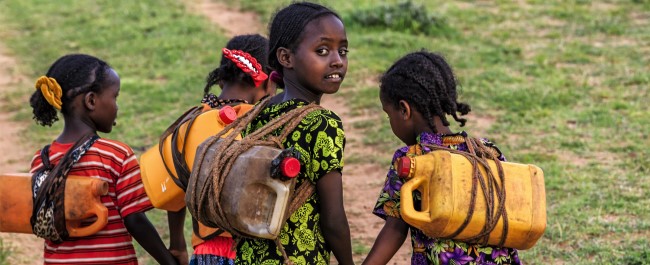Making water and sanitation services more resilient to climate change

How resilient to climate change is water, sanitation and hygiene in Low to Middle Income Countries? We are developing indicators to measure their resilience.
The challenge
Many low- and middle-income countries (LMICs), such as Ethiopia and Nepal, face huge challenges in providing universal access to safe drinking water and sanitation. The limited access to safe water and sanitation means that the burden of diarrhoeal disease in both countries is high. For instance, the World Health Organisation (WHO) estimate that in 2016 there were over 10,000 deaths caused by unsafe water and sanitation in Ethiopia. Outbreaks of cholera and other diarrhoea diseases are persistent problems in both countries.
There is commitment from the governments of Nepal and Ethiopia and their partners to provide universal access to safe and resilient water and sanitation. However, they face significant threats from future changing precipitation patterns caused by climate change.
Nepal is expected to get overall slightly wetter with a somewhat stronger monsoon, but this will be accompanied by the intensification of precipitation leading to increased flood risks and threats to water and sanitation services. Increasing temperatures are leading to the melting of glaciers, which particularly affects communities that rely on springs recharged from local glacial meltwater.
Ethiopia is projected to get significantly warmer and this is likely to increase risks of diarrhoeal disease; there is more uncertainty regarding future precipitation trends but Ethiopia is likely to get wetter overall, albeit with significant temporal and spatial variation.
Building more resilient water and sanitation services is therefore a priority in both countries and to achieve this a cross-disciplinary approach is needed.
What we're doing in partnership
We have developed and tested indicators and tools to measure how resilient water and sanitation services are to climate change in rural communities and small towns in Nepal and Ethiopia. We integrated climate, engineering, mathematical and social science to analyse the key factors determining the resilience of water and sanitation to precipitation events.
We have linked with ongoing initiatives to inform national and local policies and projects aimed at improving the resilience of water and sanitation services. We are collaborating with partners in WHO, BMGF, and UNICEF to ensure the research has broader application and to support wider uptake.
How it helps
This collaborative partnership project is helping to identify actions that will build resilience and provide greater confidence on the effectiveness of resilience measures being deployed. This project will help Nepal and Ethiopia to meet Sustainable Development Goal 6 (ensuring access to sustainable and resilient water and sanitation services) and contribute to meeting targets under their National Adaptation Plans of Action (NAPA).
Working with national governments and international partners is providing an opportunity to help influence and shape future programming and policy in Ethiopia and Nepal. Ultimately benefiting the populations of LMICs by providing indicators and tools to assess resilience of water and sanitation services, promote action to improve access, help reduce diarrhoeal disease and the number of children under 5 who die every day from diarrhoea.
By ensuring water and sanitation services are resilient and continue to function even during extreme events, the project will help reduce drudgery for women and girls who bear the burden of collecting water and who are most exposed to risks of violence when they lack a toilet. It will help establish healthier, more productive populations better able to grasp new economic opportunities and jobs. Finally, it will place LMICs on a stronger footing and better able to adapt to the risks of future climate change.
Investigators
- Professor Guy Howard, School of Civil Aerospace and Mechanical Engineering, Faculty of Engineering (PI)
- Dr Eunice Lo, School of Geographical Sciences, Faculty of Science (Co-I)
- Dr Dann Mitchell, School of Geographical Sciences, Faculty of Science(Co-I)
- Dr Adrian Flint, School of Sociology, Politics and International Studies, Faculty of Social Sciences and Law(Co-I)
- Dr Maria Pregnolato, School of Civil Aerospace and Mechanical Engineering, Faculty of Engineering(Co-I)
- Dr Hermes Gadelha, School of Computer Science, Electrical and Electronic Engineering and Engineering Mathematics, Faculty of Engineering (Co-I)
 Lead researcher profile
Lead researcher profile
Professor Guy Howard, Global Research Chair Environmental and Infrastructure Resilience, Department of Civil Engineering
 Research partner profile
Research partner profile
Dr Abraham Geremew, Haramaya University, Ethiopia
Research partner profile
Professor Subodh Sharma, Kathmandu University, Nepal
Related research centres
Partner organisations
- Professor Subodh Sharma, Kathmandu University, Nepal
- DrAbraham Geremew, HaramayaUniversity, Ethiopia
- Ms Elena Villalobos-Prats, Dr Jennifer de France, Ms Kate Medlicott, World Health Organisation, Switzerland
- Mr Jan Willem Rosenboom, Bill & Melinda Gates Foundation, USA
- Ms Sylvisa Gaya, UNICEF, USA